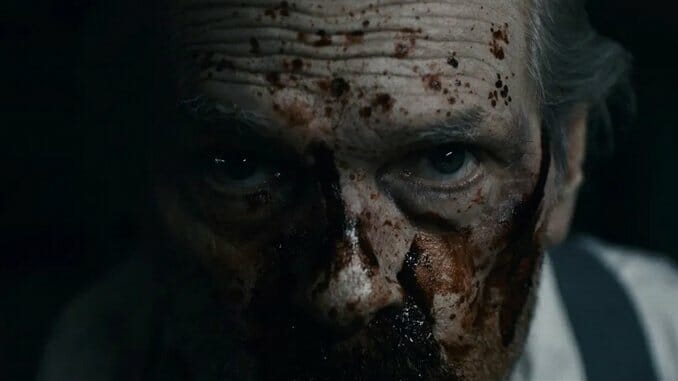Shudder’s Stay Out of the Attic Is Half-Baked Horror Commentary

Horror traditionally has a unique capability of rising to the moment. Given, perhaps, its long-established mission to shock and titillate, the genre has acutely been able to pinpoint the social fears and taboos of a period in time, be it female sexuality triggering Norman Bates’ violent misogyny in Psycho, rampant consumerism in Dawn of the Dead or racial retribution in Candyman. Of course, with every generation-defining classic comes 20 cheap imitators cashing in on a trend—or what eventually becomes one. Recently, for every film that tries to emulate Get Out, we inevitably end up with our fair share of ill-conceived flicks like Antebellum and Skin.
Unfortunately, Jerren Lauder’s Shudder Original movie Stay Out of the Attic is no exception to this rule. The film follows a three-person moving company, started by team leader Schillinger (Ryan Francis) to valiantly aid ex-cons such as himself, as they pack up a creepy old mansion. The elderly owner (Michael Flynn) offers a large sum of cash in exchange for the team to swiftly empty the expansive abode over the course of a single evening. The old man has only one demand: Stay Out of the Fucking Attic! (The team is also warned to avoid the basement, which is left out presumably because it would’ve made the title too long).
Anyone who’s ever watched a horror movie—or read the title of this film—would have misgivings about this job, and fellow movers Imani (Morgan Alexandria) and Carlos (Bryce Fernelius) are right to quickly suspect the unspeakable horrors housed within the stereotypically spooky forbidden rooms. However, after what seems like an eternity of moving-day montages comes the film’s attempt to genuinely shock viewers: A tandemly dull and tactless unraveling of a Nazi plotline that features real-life war criminals alongside garden-variety boogeymen as the principle antagonists, yielding a pointless if not overtly offensive result.
While the movers are presented as an unlikely trio to survive a horror film due to their racial and political differences, the film’s attempts to subvert expectations ultimately reduce the characters to dull caricatures. Its noble ambitions of social commentary register as basic at best and tone-deaf at worst. Highlighting how marginalized people—like Black woman Imani and Latino single father Carlos—are incarcerated for far less than their white counterparts, then neglecting to explore those elements of their characters reads less as critique and more like mere set dressing. This is made uncomfortably apparent when Schillinger reveals his neo-Nazi tattoos, explaining that he joined the Aryan Brotherhood in prison in order to ensure protection.
-

-

-

-

-

-

-

-

-

-

-

-

-

-

-

-

-

-

-

-

-

-

-

-

-

-

-

-

-

-

-

-

-

-

-

-

-

-

-

-








































